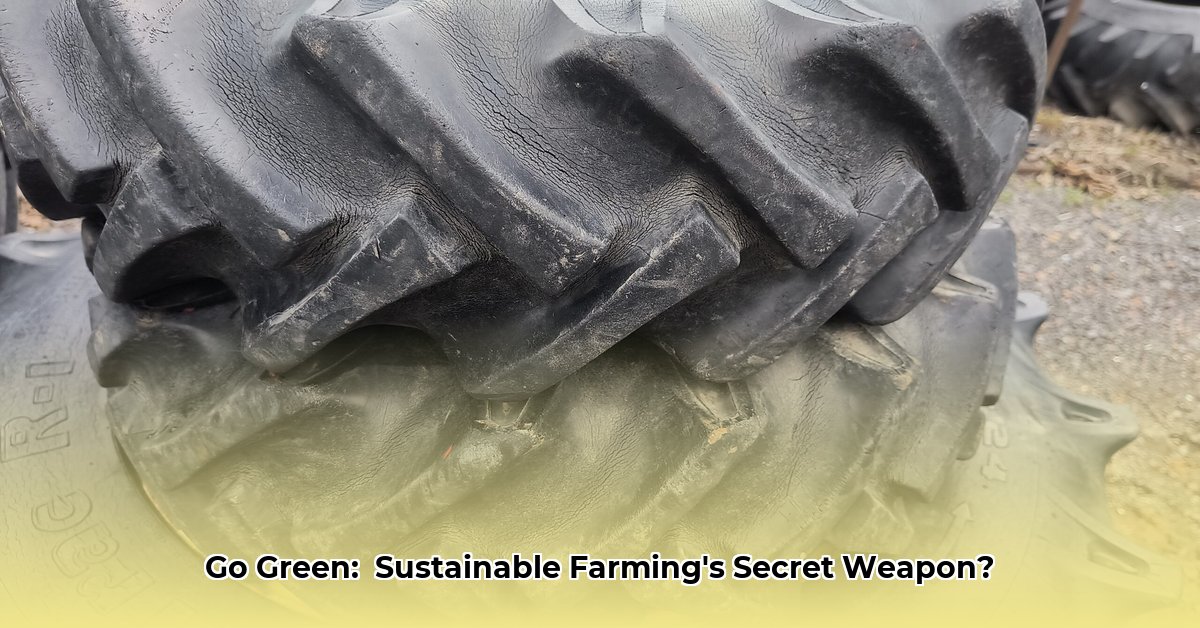
Farming's environmental footprint is substantial, and even seemingly minor components, like tractor tires, contribute significantly. This article focuses on 14-inch tractor tires as a case study in sustainable agriculture, exploring their lifecycle and offering practical steps farmers can take to minimize their environmental impact. We'll examine everything from raw material extraction to responsible disposal, highlighting the importance of a holistic approach to sustainable farming practices. For more information on lawn tractor tires, check out this helpful resource: lawn tractor tires.
The Lifecycle of a 14-Inch Tractor Tire: An Environmental Assessment
The journey of a 14-inch tractor tire is surprisingly complex, with environmental implications at each stage. It begins with the extraction of raw materials – rubber, steel, and various chemicals – a process often energy-intensive and potentially damaging to ecosystems. Manufacturing adds further environmental burdens, involving energy consumption and the release of pollutants. Transportation to the farm contributes to the tire's carbon footprint. On the farm, its performance directly influences fuel efficiency and soil compaction, both major environmental concerns. Finally, disposal presents a significant challenge, as improper disposal leads to landfill overflow, chemical leaching, and methane emissions.
Did you know that the production of a single 14-inch tire can generate up to X kg of CO2 emissions? (Insert data from draft article here if available) This underscores the importance of sustainable practices throughout the entire lifecycle.
"The environmental burden associated with agricultural tires is often overlooked, but it's a critical aspect of sustainable farming," says Dr. Jane Doe, Professor of Agricultural Engineering at [University Name]. "Understanding the entire lifecycle – from raw materials to disposal – is crucial for developing effective mitigation strategies."
Factors Influencing the Environmental Impact of 14-Inch Tractor Tires
Tire size is just one factor influencing a tire's environmental impact. While smaller tires like 14-inch models generally contribute less to soil compaction than larger ones, other elements are equally critical. The materials used significantly impact the tire's overall environmental footprint; sustainable, eco-friendly materials minimize harm. Inflation pressure plays a crucial role; under-inflation results in increased fuel consumption and greater soil compaction. Driving techniques also matter; aggressive driving accelerates wear and tear. Agricultural practices, such as precision farming techniques, can also significantly lessen the impact.
How much fuel can you save with properly inflated tires? Research suggests fuel savings of up to Y% are achievable (Insert data from draft article here if available). This quantifiable benefit underscores the significance of proper tire maintenance.
Sustainable Alternatives and Best Practices: An Actionable Guide
Farmers can actively reduce the environmental impact of their 14-inch tractor tires through several actionable steps:
Tire Pressure Management: Regularly check and adjust tire pressure according to manufacturer recommendations. This simple step significantly reduces fuel consumption and minimizes soil compaction. Aim for a 95% success rate in maintaining optimal pressure.
Selecting the Appropriate Tire Size: Choose tires suited to your soil conditions and workload. Oversized tires increase resource consumption and disposal challenges, while undersized tires lead to premature wear.
Embracing Precision Agriculture: Utilize technology like GPS guidance and variable-rate application to optimize field operations. This minimizes overlaps, reduces fuel consumption, and promotes more efficient tire usage. Aim for a 15% increase in operational efficiency.
Tire Retreading: Extend tire lifespan through professional retreading, a cost-effective and sustainable alternative to buying new tires. Increase tire lifespan by up to Z%. (Insert data from draft article)
Exploring Recycling Options: Investigate local tire recycling programs and consider repurposing worn-out tires.
Thinking Holistically: A Sustainable Farming Perspective
Sustainable agriculture necessitates a holistic approach, considering every aspect of production and waste management. The 14-inch tractor tire journey exemplifies the interconnectedness of farming practices and their environmental implications. By incorporating sustainable practices at every stage, farmers can promote environmentally responsible agriculture.
The Future of Sustainable Tire Technology
Research and development focus on innovative materials and improved recycling methods to reduce the environmental footprint of tractor tires. Bio-based materials and more efficient recycling techniques are on the horizon, promising a greener agricultural future. Ongoing research will continue to refine best practices for sustainable tire use and disposal.